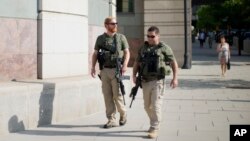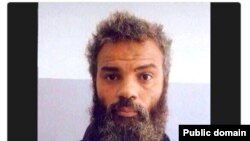U.S. prosecutors said the militant accused of carrying out the deadly 2012 attacks on American outposts in Benghazi, Libya, was motivated by his extreme anti-Western fervor.
American authorities detailed some of their allegations against the suspect, Ahmed Abu Khatallah, before a judge in Washington on Wednesday ordered him held in prison until his trial.
He was captured last month by U.S. military commandos near Benghazi and is accused in the terrorist assault that killed U.S. Ambassador Christopher Stevens and three others.
Heavily armed security officials guarded Washington streets as police whisked Abu Khatallah in a speeding motorcade to a federal courthouse a few blocks from the U.S. Capitol for the detention hearing.
Abu Khatallah's attorney did not object to his continued imprisonment while he awaits trial. The 43-year-old Libyan listened to the brief proceedings on headphones as an interpreter translated them into Arabic.
'Extremist ideology'
The prosecutors said in a court filing that Abu Khatallah was driven by "extremist ideology."
He first appeared before a U.S. magistrate last Saturday and pleaded not guilty to the allegations.
The prosecutors said in the days before the September 11, 2012, attack, Abu Khatallah "voiced concern and opposition to the presence of an American facility in Benghazi."
The prosecutors said he was a commander in Ansar al-Sharia, an extremist Libyan militia the United States has designated as a terrorist organization.
Prosecutors said he was among 20 or more men armed with AK-47-type rifles, handguns and rocket-propelled grenade launchers who first attacked a U.S. consulate and set it afire.
The United States alleges the militants later assaulted a nearby Central Intelligence Agency outpost.
U.S. investigators questioned Abu Khatallah about the attack as they brought him to the United States aboard a Navy warship.
They later flew him to Washington for last weekend's court appearance and are holding him in a prison near Washington.
The details of the attack have played a contentious role in U.S. politics.
Terrorist attack
The Obama administration initially contended the Benghazi attacks, carried out on the anniversary of the massive 2001 al-Qaida terrorist attacks in the U.S. that killed nearly 3,000 people, were spawned by protests against an anti-Muslim video on the Internet.
But authorities have long since said it was a terrorist attack.
The attack occurred two months before President Barack Obama was re-elected.
Republicans have claimed Obama wanted to minimize the possibility the attack was terrorism-related so as to not hurt his re-election chances.
Multiple congressional hearings have been held about the attack and another one is set for the coming weeks.






